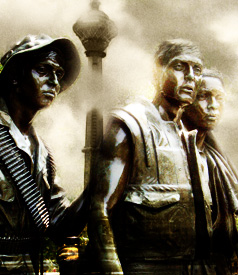Support justice-driven, accurate and transparent news — make a quick donation to Truthout today!
On September 2, 1945, Ho Chi Minh, the most important and popular leader in the French colony of Indochina, announced the creation of the Democratic Republic of Vietnam. After writing President Harry S. Truman for assistance, and after patterning Vietnam’s Declaration of Independence after America’s Declaration of Independence, he invited US military and political officials to attend a celebration in honor of Vietnam’s freedom. Later in the day, Ho Chi Minh ordered “The Star Spangled Banner” to be played in their honor.
Several weeks later, though, Ho Chi Minh and his Vietminh guerillas were beset by over 200,000 British- and US-backed Nationalist Chinese troops. Instead of unification and freedom, Ho Chi Minh and the tattered Vietminh were forced to continue their fight for liberty. One month later, several US officers were killed in action. Years later, on May 7, 1954, the French were defeated at the Dienbienphu. Even though the Geneva Conference had scheduled elections to occur to reunite the country, the US intervened.
The US also increased military and economic aid, igniting a civil war between North and South Vietnam. By 1961, 8,000 US troops had arrived in South Vietnam. By 1963, there were 16,000 military personnel, and 24,000 in 1964. After the Gulf of Tonkin debacle, the US initiated massive bombing campaigns against North Vietnam. By 1968, there were over 500,000 US troops in South Vietnam. The TET Offensive, My Lai Massacre and killings at Kent State were symbolic of a much deeper malady and immoral war.
When the Vietnam conflict ended, four million Vietnamese had died. The war spread to Laos and Cambodia. In Cambodia, Pol Pot seized power, killing two million Cambodians. While almost 60,000 US troops had died, America’s Great Society Programs were defunded. Millions of acres of Vietnamese rainforest had also been destroyed by defoliants, along with future generations who would experience cancer and birth defects.
In politics, dichotomous or either/or thinking can be very dangerous, even deadly. Either/or thinking is when an individual or nation is only able to see the world in terms of black and white or in the extremes. Either/or thinkers tend to view the world as good versus evil, too, with themselves, of course, being good. It was this type of thinking in America that rejected Ho Chi Minh’s overtures, along with many other leaders and nations that have had differing political and economic systems than that of the US.
The White House has just confirmed that President Barack Obama received a letter from Iran’s President Mahmoud Ahmadinejad. For years, Iran has also continually reached out to the US to establish better relations. The letter has asked for better cooperation, the possibility of exchanging nuclear fuels and working together to combat terrorism and nuclear proliferation. Unfortunately, President Obama says he wants to move forward boldly and quickly to gain support for renewed sanctions against Iran.
Either/or thinking, especially when used with the force-of-reason thinking, which believes in using only coercion and raw power or forcing people to accept the truth which might in the end be untrue, are very dangerous doctrines. They can readily be viewed by observing the US-led pre-emptive wars and post-lengthy occupations in Iraq and Afghanistan that have caused mayhem, death and destruction for millions. They can also be seen by how the US is unwilling to work with Iran and continues to threaten the Islamic Republic with sanctions and war.
Iran welcomes anyone who can offer solutions to problems in the Middle East and in the world. Will the US do the same? In order for the US to truly be of assistance and to promote a more secure peace in these regions, however, its leaders and people must reject either/or and force-of-reason thinking. If the US is unable to do this, southwest Asia has the potential to become another Indochina, meaning, another Vietnam and Cambodia that cost the lives of six million people.
In the end, is not the march of either/or thinking really the march of folly? Whether it be economic systems like Communism or political systems like Islamic republics, the US must learn to cooperate with others who perceive the world in a different way.
Speaking against the authoritarian crackdown
In the midst of a nationwide attack on civil liberties, Truthout urgently needs your help.
Journalism is a critical tool in the fight against Trump and his extremist agenda. The right wing knows this — that’s why they’ve taken over many legacy media publications.
But we won’t let truth be replaced by propaganda. As the Trump administration works to silence dissent, please support nonprofit independent journalism. Truthout is almost entirely funded by individual giving, so a one-time or monthly donation goes a long way. Click below to sustain our work.
